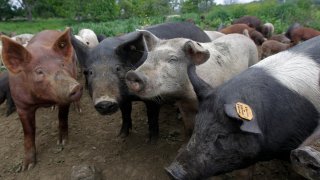
Nearly six years after Massachusetts voters overwhelmingly approved new farm animal welfare standards, regulations governing the production and sale of pork products remain unenforced while officials await a U.S. Supreme Court decision that could nullify the law.
State regulators agreed in court with restaurant and pork industry groups to pause implementation of porcine regulations, which were set to kick in Aug. 15, and instead await a ruling from the nation's high court that might clear the way for Massachusetts to proceed or effectively doom the Bay State's law as unconstitutional.
Stephen Clark, president of the Massachusetts Restaurant Association that secured a halt to the state regulations, said parties involved in the state lawsuit are now in a "holding pattern" while the case plays out at the national level.
"Giving us the time to know what's going to happen — the Supreme Court is going to make it pretty clear what the regulations are going to be," Clark told State House News Service. "We'll know the rules of the road after they issue (a decision)."
Get Boston local news, weather forecasts, lifestyle and entertainment stories to your inbox. Sign up for NBC Boston’s newsletters.
The U.S. Supreme Court, where a majority of justices were appointed by Republican presidents, has already been a prominent figure in Massachusetts policymaking this year. Its decision to overturn the national right to an abortion enshrined in Roe v. Wade prompted a response law protecting access to the procedure in the Bay State, and a June ruling about a New York state gun law led to a shift in Massachusetts as well. In that case, the court declared that New York could not constitutionally require its residents to demonstrate a "special need" before receiving a license to carry a firearm in public for self-defense. Justices singled out a "good reason" section of Massachusetts law as analogous to the requirement they deemed unconstitutional in Massachusetts.
The fate of the Massachusetts pork law now appears tied to a measure California voters enacted in 2018, which similarly required in-state producers to house breeding pigs in bigger spaces and prohibited the sale of cuts of pork derived from any animal held in violation of those standards, even if the meat was shipped in from another state.
That last provision set off a legal maelstrom. The National Pork Producers Council and the American Farm Bureau Federation sued, alleging that the California law known as Proposition 12 would impose limits on industry practices outside of its borders in violation of constitutional protections of interstate commerce.
Local
In-depth news coverage of the Greater Boston Area.
California, the industry groups told the court, accounts for about 13% of American pork consumption and imports more than 99.8 percent of the pork Californians use.
"Because of the nature of the pork industry and its product — a pig progresses through multiple facilities outside California as it is raised, and is processed into many different cuts of meat that are sold across the country — Proposition 12 in practical effect regulates wholly out-of-state commerce," petitioners wrote in their initial filing to the U.S. Supreme Court. "It requires massive and costly alteration to existing sow housing nationwide, necessitates either reduction of herd sizes or building of new facilities to meet its space mandates, raises prices in transactions with no California connection, drives farms out of business and promotes industry consolidation, and will be policed by intrusive inspections of out-of-state farms conducted by California's agents."
The Supreme Court scheduled oral arguments in the California case for Oct. 11, and Clark said he expects a decision to land some time between December and June 2023.
Nearly three-quarters of Massachusetts voters approved the 2016 ballot question, which also dealt with enclosure conditions for egg-laying hens and calves raised for veal.
The law took effect on Jan. 1, 2022, after the Legislature intervened at the last minute and rewrote key sections to reflect some egg industry changes that had taken place in the past few years. Their update also delayed the start date for the restrictions on pork sales until Aug. 15.
"I want the pork industry to know in no uncertain terms that there will be no further extensions for them in Massachusetts," Sen. Jason Lewis, a Winchester Democrat who co-led the conference committee behind the updated legislation, said last year. "They must come into compliance with Massachusetts law, overwhelmingly approved by our voters back in 2016, if they wish to continue selling their products to our consumers."
His prediction did not come true.
A coalition of restaurant and pork industry groups including NPPC, the Massachusetts Restaurant Association and the New Hampshire Lodging & Restaurant Association filed a lawsuit shortly before the Aug. 15 effective date for the pork regulations, asking for enforcement to be delayed because of the specter of a Supreme Court ruling on the horizon.
The plaintiffs, Attorney General Maura Healey's office and the Massachusetts Department of Agricultural Resources disagreed on the forecast impacts of the law, but they agreed that the court's ongoing case carries major implications.
All parties signed a joint motion to stay, and U.S. District Court Judge Mark Wolf on Aug. 11 ordered that enforcement of the pork law will not begin until 30 days after the highest court rules in the California case.
Healey's office confirmed the egg- and veal-related sections of the law remain in effect and are being enforced, and only the pork provisions are paused under the court order.
Both Healey's office and MDAR declined to comment on the record, citing pending litigation.
On Aug. 12, Healey joined an amicus brief alongside officials from Michigan, Illinois, Colorado, Connecticut, Washington, D.C., Maine, Maryland, Nevada, New Jersey, New Mexico, New York, Oregon, Rhode Island and Washington in support of California.
They argued that the "expansive view" of interstate commerce constitutionality the pork industry groups sought "would distort the States' traditional regulatory role and undermine their sovereign authority to regulate matters of importance within their borders."
The California and Massachusetts laws are not identical. California's regulators, for example, sought to ban the sale of meat from breeding pigs and their offspring if the animals were housed with less than "24 square feet of usable floorspace" in a section effective Jan. 1.
Voter-approved laws in both states, though, call for ensuring that breeding pigs have room to lie down, stand up, turn around freely and fully extend their limbs. Both also carry out-of-state implications: pork meat and products covered by the regulations could not be sold in California and Massachusetts if the pigs from which they came were housed in another state in violation of the space requirements.
California officials argue that it is legal for states to regulate the sale of products within their borders, even if doing so creates ripple effects elsewhere in the country or upstream in supply chains.
A voter information guide made clear that approving the question would "likely result in an increase in prices," California officials wrote in their court brief, and nearly 63% of voters still supported the measure.
Earlier rulings in the process have gone in California's favor. A federal judge in San Diego said the pork industry groups had no claim of a constitutional violation and dismissed the suit, and the Ninth Circuit Court of Appeals agreed, according to the Los Angeles Times.
Pork industry representatives got a boost in their legal fight from the Biden administration.
Writing on behalf of the U.S. government, Solicitor General Elizabeth Prelogar and a team from the Department of Justice filed an amicus brief in support of the National Pork Producers Council and other petitioners who challenged the California law.
Prelogar and federal attorneys argued that a state like California cannot extend its police powers beyond its borders "by regulating out-of-state activity with no in-state impact based on a philosophical objection." Instead, they said, it should be up to voters in pork-producing states to "determine what constitutes 'cruel' treatment of animals housed in those States."
The solicitor general also portrayed California's law as a slippery slope, arguing that if the court were to let it stand, other states could condition pork sales on "virtually any other aspect of animal husbandry."
"The combined effect of those regulations would be to effectively force the industry to 'conform' to whatever State (with market power) is the greatest outlier," Prelogar wrote.
If the court's ruling allows the Massachusetts pork regulations to take effect, Clark said he is concerned that many producers will not be in compliance, leaving a smaller universe of available suppliers and driving up costs for businesses and consumers. Those impacts would be most pronounced among Asian and Latino businesses, Clark said, for whom pork is often a staple protein.
"Most independent restaurants didn't know that this was coming," Clark said. "Some of the bigger restaurants that have buying teams were able to get out early and make some adjustments, but most independent restaurants don't have that luxury and certainly don't have the availability to adjust their purchasing patterns, so there was going to be a huge gap in available pork for those restaurants."



